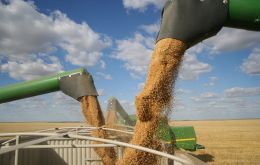MercoPress. South Atlantic News Agency
Agriculture
-
Monday, December 7th 2020 - 08:59 UTC
Brazil has sold in advance 56,5% of its 2020/21 soybeans crop

Brazilian farmers have sold 56.5% of their beans in advance through December 4, Safras & Mercado, an agribusiness consultancy, said in a statement last Friday. Considering Brazil is poised to collect 133.517 million tons of the oilseeds this season, the volume of pre-sold soy amounts to an estimated 75.403 million tons, Safras said.
-
Friday, December 4th 2020 - 08:00 UTC
Food commodity prices rose sharply in November to their highest in six years

Global food commodity prices rose sharply in November to their highest level in nearly six years, according to a benchmark United Nations report released on Thursday. The FAO Food Price Index averaged 105.0 points during the month, up 3.9% from October and 6.5% higher than its value a year earlier. The monthly increase was the sharpest since July 2012, putting the index at its highest level since December 2014, the Food and Agriculture Organization said.
-
Friday, December 4th 2020 - 07:36 UTC
FAO trims world 2020 cereal output forecast

FAO has further lowered its forecast for global cereal production in 2020, which now stands at 2 742 million tons - still a record high and 1.3% above the previous year's outturn. The new forecasts released today with FAO's Cereal Supply and Demand Brief point to world coarse grains production of 1,470 million tons, wheat production of 761.7 million tons, and rice output of 508.4 million tons.
-
Wednesday, December 2nd 2020 - 08:53 UTC
Argentine agro-export industry workers on strike freezing shipments

Two major unions in Argentina's agro-export industry, one of the world's top grains exporters, said that they would launch an indefinite strike starting Tuesday morning, ramping up a standoff that has been simmering for months.
-
Tuesday, December 1st 2020 - 08:00 UTC
Wheat prices fell after Australia forecasted its second highest crop ever

Wheat prices fell after Australia forecast its second-highest crop ever and Russia proposed curtailing grain exports next year. Wheat futures fell as much as 3.3% in Chicago trading, the lowest for the contract in almost eight weeks. Corn and soybeans also fell following rainfall in South America during the weekend.
-
Monday, November 30th 2020 - 08:05 UTC
Christmas turkeys culled in England because of bird flu H5N8

All 10,500 turkeys will be culled at a farm in North Yorkshire, in England after bird flu was confirmed at the site. The H5N8 strain of avian influenza was found at a turkey fattening premises near Northallerton on Saturday.
-
Friday, November 27th 2020 - 08:55 UTC
Deadly avian influenza rapidly spreading and ravaging Europe

A highly contagious and deadly form of avian influenza is spreading rapidly in Europe, putting the poultry industry on alert with previous outbreaks in mind that saw tens of millions of birds culled and significant economic losses.
-
Thursday, November 26th 2020 - 08:40 UTC
Brazil renews wheat import quota free of tariff, from outside Mercosur

Brazil's Chamber of Foreign Trade (Camex) has renewed the import quota of 750,000 tons of wheat from outside Mercosur and exempt of the Common External Tariff (TEC) currently at 10%. Purchases can be made from Novr 18 this year to November 17, 2021.
-
Wednesday, November 25th 2020 - 09:30 UTC
China competes in the dredging of Paraguay/Parana Waterway which handles 90 million tons of grains

A Chinese company entered the competition to manage a section of the Paraguay-Paraná Waterway, joining four European companies seeking to win the concession to deepen the draft and provide maintenance on approximately 1,238 kilometers of the river course beginning in 2021.
-
Tuesday, November 24th 2020 - 09:02 UTC
China's appetite for imported pork slowing as the country recovers its herd

China is starting to curb its appetite for imported pork as it regains its domestic stock and domestic meat prices are beginning to fall. Added to this are consumer concerns about the presence of Covid-19 on food packaging that arrives from other countries.